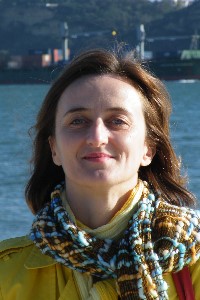 Dr Giuseppina Raggi (Italy). Graduate in Italian Literature and History (University of Bologna – 1994); MA in History of Art (University of Bologna – 1997); MA in History of Art (University of Lisbon – 1999); and PhD in History / History of Art (University of Lisbon and University of Bologna – 2005), she is also musician (flautist).
Dr Giuseppina Raggi (Italy). Graduate in Italian Literature and History (University of Bologna – 1994); MA in History of Art (University of Bologna – 1997); MA in History of Art (University of Lisbon – 1999); and PhD in History / History of Art (University of Lisbon and University of Bologna – 2005), she is also musician (flautist).
She is Researcher at the Centre for Social Studies of the University of Coimbra (Portugal), and she integrates the research group Cities, Cultures, and Architecture (CCArq). She was Visiting Professor in History of Art at the University of São Paulo (FAU/USP); University of Campinas (IFCH/UNICAMP); Federal University of Bahia (Brazil); University of Udine (Italy). She is expert in “quadratura” painting (16th-19th centuries) based on the Bolognese tradition of art and perspective and disseminated in the Early-Modern Europe and World, especially through the Portuguese overseas empire. Between 2012 and 2016, she was the Scientific Committee Coordinator of the European Project Marie Curie Actions / IRSES: “Bahia 16-19. Salvador da Bahia: American, European and African forging of a colonial capital city”.
She is the co-author of five videos for the Portuguese Secondary Schools, titled “O Atlântico dos Outros. A Escravatura Negra no Império Português”, produced within the project “O Atlântico dos outros. África, Bahia, Portugal e um oceano partilhado (sécs. XVII-XIX)”, funded by the Calouste Gulbenkian Foundation (2017). Currently her research interests are (1) the architectural and urbanistic policy of the King of Portugal John V: the project for Western Lisbon and the relation between Filippo Juvarra and João Frederico Ludovice; (2) the cultural policy of the Queen of Portugal Maria Anna of Austria (1708-1754): the introduction of Italian opera in Portugal and the building of opera theatres by Giovan Carlo Sicinio Bibiena; (3) the African artistic proactivity within the Portuguese empire during the early-modern era, and the politics of recognition in contemporary Portugal and Europe.
